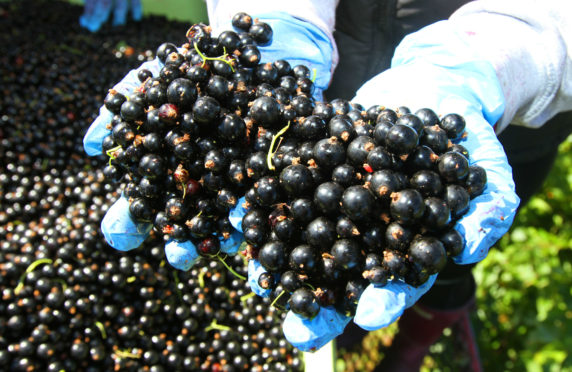Thousands of tonnes of juicy Ben Lawers, the brand new blackcurrant variety which has been bred to cope with Britain’s changing climate, are being shaken into specialist harvesting machines across the country this week.
The first harvest of 75,000 Ben Lawers blackcurrant bushes in fields from the outskirts of Dundee to Somerset and Kent is the culmination of 20 years of research by the James Hutton Institute (JHI) which aims to ensure the crop can continue to be productive despite increasingly warmer winters.
Blackcurrants need a winter chill to bear fruit come summertime, prompting Lucozade Ribena Suntory (LRS) which uses 90% of Britain’s blackcurrants to make Ribena, to invest £10 million in JHI research on the new variety which is able to adapt to shorter, milder chilling.
Dr Dorota Jarret, a soft fruit breeder at the James Hutton Institute’s commercial subsidiary, James Hutton Ltd, said: “Hopefully this cultivar will pioneer innovation in climate resilient crop category, deliver exceptional quality and make the way for further climate-resilient cultivars that are currently on trials at the JHI thanks to Lucozade Ribena Suntory’s recent investment.”
Andy Husband from East Adamston Farm, Dundee said: “We are in need of varieties that can adapt to the climate, have better disease resistance and are still delicious, which is why we are proud to say that the new Ben Lawers variety is helping to provide a strong harvest this year.
“By growing and developing more breeds like this we will be able to keep sustainable blackcurrant growing in Scotland.”
Harriet Prosser, agronomist at LRS, said: “Harvest is always the most exciting time of the year but this time around it promises to be doubly rewarding.
“This year’s weather has demonstrated why we need to be on the front foot in adapting to a changing climate.”
Blackcurrants have been bred at JHI since 1956 and the institute’s varieties now account for around half of all the blackcurrants grown in the world, and have an estimated 95% market share in the UK.
Only a handful of LRS’s 35 dedicated growers are in Scotland
nnicolson@thecourier.co.uk










